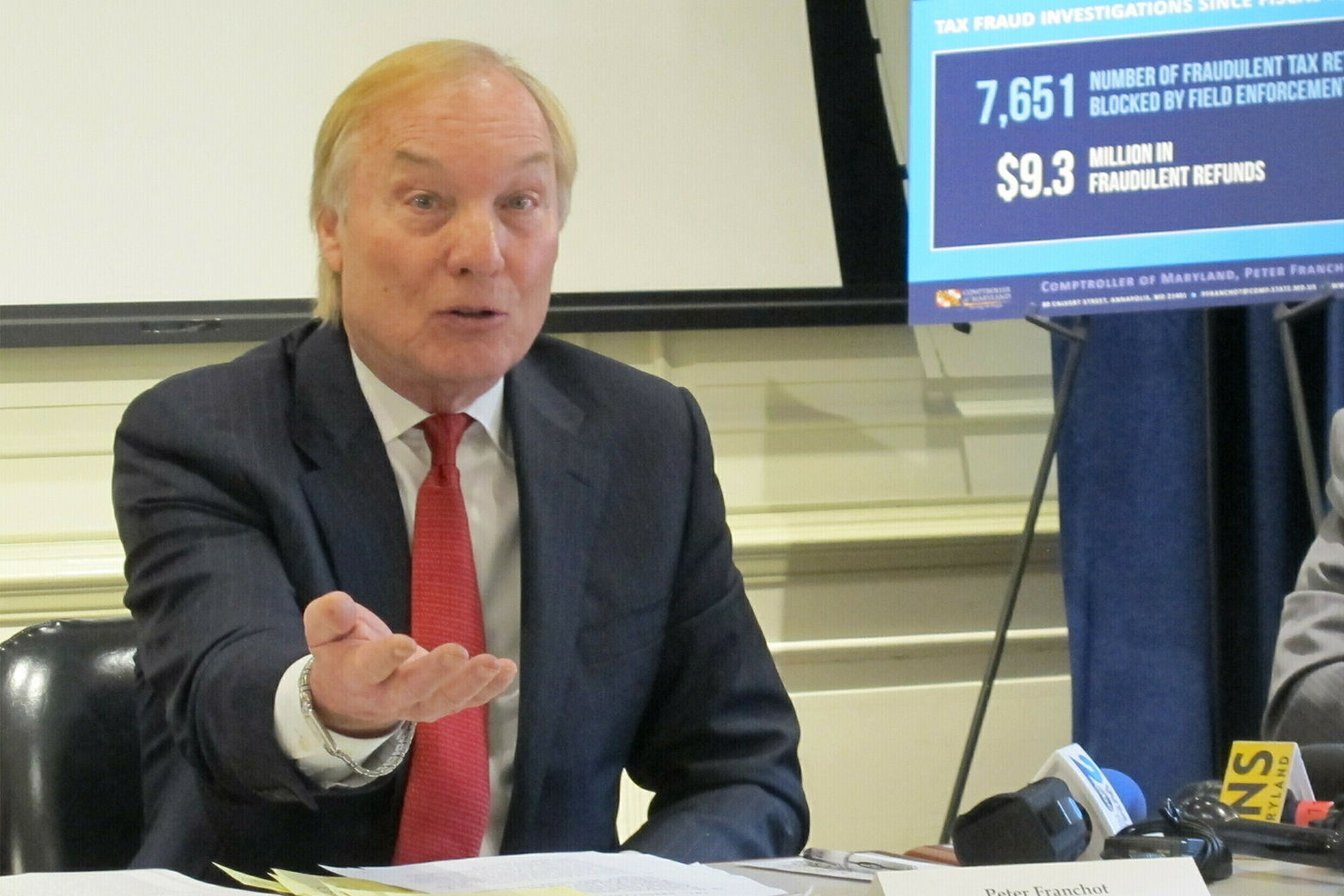This article was republished with permission from WTOP’s news partners at Maryland Matters. Sign up for Maryland Matters’ free email subscription today.
This content was republished with permission from WTOP’s news partners at Maryland Matters. Sign up for Maryland Matters’ free email subscription today.

Maryland Comptroller Peter V.R. Franchot (D) told House and Senate lawmakers this week that he hopes a bill to remove his office’s regulatory authority over tobacco and alcohol can be undone this coming General Assembly session.
“This situation with this enforcement division, which is being torn apart as we speak, is the grossest mismanagement of public funds I have ever seen in my 33 years [in Annapolis],” Franchot told the Joint Committee on the Management of Public Funds.
Last legislative session, the General Assembly passed a bill that transfers the alcohol and tobacco regulatory powers from the comptroller’s office to a new five-member Alcohol and Tobacco Commission, to be appointed by the governor.
Franchot at the time derided the legislation as petty political retribution for his early advocacy of the craft beer industry. Supporters of the bill said it would remove an elected official from oversight of an industry from which he receives campaign donations; Maryland is one of only a few states that have an elected official overseeing the alcoholic beverage industry in the same way.
Gov. Lawrence J. Hogan Jr. (R) vetoed the measure, which he called wasteful, but the General Assembly voted to override the governor and pass the bill into law, effective July 1, 2020.
Now, after spending a few months trying to implement the shift, Franchot and Budget Secretary David R. Brinkley wrote to legislative leaders that the bill has “irreconcilable contradictions, inconsistencies and logical deficiencies” that at the very least will have to be addressed in the upcoming legislative session.
Franchot suggested that the General Assembly also could consider undoing the change.
“If someone on the committee could take a look at it and maybe think about let’s let bygones be bygones and let’s put our personal feelings aside and let’s not do something which is injurious to the state because of ancient history,” he told the Joint Committee on the Management of Public Funds.
Franchot and his aides are concerned about the status of the division of the current Field Enforcement Division in the comptroller’s office, which is designated as a statewide law enforcement agency with sworn officers who can make arrests, conduct searches, issue subpoenas and summonses and seize contraband. Through legislation, lawmakers expected that office to divide, with roughly half of the Field Enforcement Division staff to move to the new commission and half remaining within the comptroller’s office to conduct other regulatory and enforcement duties, including over motor fuel and tax fraud.
But in a quarterly update about the shift, Franchot and Brinkley said the legislation did not adequately establish law enforcement authority for officers who go to work for the new commission. They also expressed concern about whether the new Alcohol and Tobacco Commission was granted proper authority to conduct administrative hearings and have sufficient staffing levels. They wrote that more than 120 new positions will be needed between the comptroller’s office and the new commission.
The extent of the changes needed to the comptroller’s office and the Field Enforcement Division have been hotly debated since the bill was introduced.
Earlier this year, Franchot’s office said shifting the Field Enforcement Division could cost as much as $50 million; the nonpartisan Department of Legislative Services estimated a $4 million price tag for the move.
“I think the obstacles that he alludes to are not as big as the comptroller maintains,” Sen. Paul G. Pinsky (D-Prince George’s) said Wednesday. “Of course, if I were in his position, I would want to talk about the difficulty of the transition too.”
Pinsky said it’s not likely that the General Assembly will reverse course on the issue in 2020.
“We’re just taking the comptroller, as the person who collects taxes, out of the business of alcohol and tobacco. I don’t think it’s radical,” Pinsky said. “…It was really a structural issue. People thought it made sound sense and they did it with their eyes wide open.”
But Len Foxwell, the comptroller’s chief of staff, said he’s heard from “dozens” of lawmakers since last session who said they didn’t understand the implications of their vote on the bill. He maintains that it will disrupt government and increase costs, which he said was “ironic” as lawmakers are scraping for ways to pay for the education reform proposals of the Kirwan Commission.
“This piece of legislation – by its intent and the inexcusably sloppy way in which it was drafted – represents everything that people resent about government,” Foxwell said.
With new leadership in the House and Senate, Foxwell expressed hope that changes to the legislation might be possible.
“Maybe they won’t be as wedded to the counter-productive grudges of the past,” Foxwell said. “Time will tell.Mary







